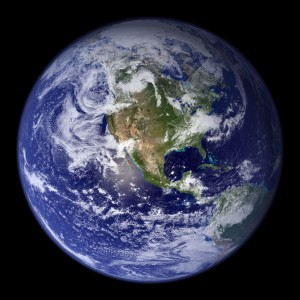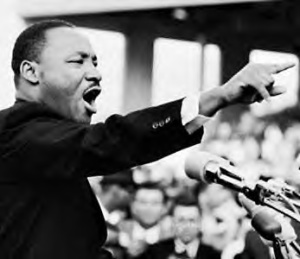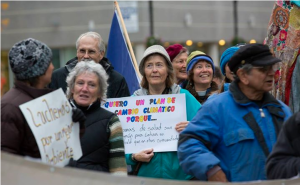Filled with the fullness of God
It’s a pleasure to be with you on this fine mid-summer morning. Thank you, Janet, for inviting me to preach. I am the Missioner for Creation Care in this diocese, so I travel from church to church, preaching the Gospel and speaking about our call as Christians to protect the Earth. This is my first visit to Grace Church and I haven’t met most of you, but already I feel as if I’m among friends. From everything I’ve heard, you are modeling the kind of Christianity we need in the 21st century: a community of people who gather week by week to be nourished by each others’ presence and by the Word and sacraments of God, and who don’t require a big old building that leaves a big old carbon footprint.
I’m told that many of you are gardeners, and that you know how to cultivate the soil, tend flowers, and grow food. I honor you for that hands-on knowledge of the Earth, and I also honor your dedication to sharing what you grow with your neighbors and to feeding a hungry world. Our call as human beings to “till and keep” the Earth (Genesis 2:15) extends outward to political engagement, as well, so I also want to thank those of you who headed off to New York City last year to join the People’s Climate March. What an astonishing event that was – hundreds of thousands of people taking to the streets to proclaim the urgent need to protect and sustain life on Earth! Thank you, friends, for all the ways you bear witness to what Archbishop Desmond Tutu calls the “supreme work” of Jesus Christ: to reconcile humanity not only with God and each other, but also with the whole of Creation. I know you’ve been reflecting for several weeks on food and faith, and I want to jump right in to our Gospel reading from John. Whenever I read this account of Jesus feeding the five thousand, I feel a wave of affection for the little boy who offered Jesus his five barley loaves and two fish.1 We don’t know very much about that boy – we get only a glimpse of him and we see him only in passing, but we do know that his gift to Jesus opened the door to a miracle, one that the early Church found so significant that, among all the stories of Jesus’ public ministry, only this one is recorded in all four Gospels. After that unknown little boy puts everything he has into the hands of Jesus, the hungry crowds are fed – in fact, they are filled with such abundance that the disciples can gather up the leftover food and pile it into twelve baskets. Like many commentators, I’ve wondered about the identity of that nameless boy whose generosity made all the difference. I imagine him as being eight, nine, maybe ten years old. Maybe he heard that Jesus was in the neighborhood, and started begging his mother to let him go see for himself the man that everyone was talking about. If I had been his mother, I would have been reluctant to say yes: for one thing, the boy might get lost in the crowds. But maybe he kept pestering her until finally she gave in and packed him a picnic lunch: some barley bread – in those days, the bread of the very poor – and a couple of pickled fish, no bigger than sardines. What happened next is told in all four gospels. The hungry crowds begin to gather around Jesus – hundreds, even thousands of them – and they have nothing to eat. The sun is hot, their feet are sore, and their stomachs are empty. One of the disciples, Philip, feels hopeless. “Six months’ wages would not buy enough bread for each of them to get a little” (John 6:7). How easy it would have been for the boy to say to himself: “So many people need food, how can my bit of lunch make a difference? I don’t want to look like an idiot. And I don’t want to give away the little I have and go hungry, myself. Let’s just wait and see. Maybe someone else will figure out what to do.” We will never know what went through the child’s mind, but obviously that wasn’t it, for something drew him forward. Maybe he tugged at Andrew’s sleeve and showed him the food that he’d brought with him. It seems that Andrew wasn’t particularly impressed. In fact, he sounds quite doubtful as he turns to Jesus to say, “There is a boy here who has five barley loaves and two fish. But what are they among so many people?” (John 6:9). As I imagine it, Jesus listened quietly to Andrew and then turned to look down at the little boy, standing there in the heat with his outstretched offering of some chunks of bread and two tiny fish. Maybe Jesus looked at him and smiled. He took the child’s gift, blessed it, and gave it to all the hungry people to eat. And they ate, and were satisfied. This is a story about hopelessness shifting to hope, about scarcity being transformed into abundance, about empty places being filled to overflowing. It’s a story about one small person initiating a miracle by offering what he has, even though it seems very small. It’s a story about the power of generosity – a story about how one small but selfless act can end up blessing everybody. I relish this story because I cherish that little boy and also because it’s so easy to identify with the crowds of people around him that are hungry, tired, passive, and overwhelmed. It’s easy these days to be agitated by anxiety or paralyzed by despair, for the challenges that press upon us are daunting. In just 200 years – a blink in geologic time – human beings have burned so much coal, gas, and oil and released so much heat-trapping carbon dioxide into the atmosphere that levels of carbon dioxide in the atmosphere are at a level that our species has never experienced before. This spring the National Oceanic and Atmospheric Administration announced that for the first time in human history the global level of carbon dioxide has topped 400 parts per million, reaching a level that hasn’t been seen in about 2 million years. For now the air is still breathable, and for now your life and mine will go on. But what’s so worrisome to scientists is that this process is happening so fast. Already we’ve shot well past 350 parts per million, the safe upper limit for carbon dioxide in the atmosphere, and the amount of carbon dioxide pouring into the atmosphere is accelerating at a record pace, one hundred times faster than natural rises in the past. If we stick to business as usual and keep to our present course, then within two, three, four generations we could raise average global temperatures to a level that would make the world very difficult for humans and other creatures to inhabit. Already oceans are heating and becoming more acidic; tundra is thawing; ice caps are melting; sea levels are rising; coral reefs are dying; massive droughts are spreading in some places and heavy rains intensifying in others. This summer the West is so dry, even a rainforest is on fire, and so many fires are burning in Alaska that the smoke has drifted through the Midwest and reached all the way down to Texas. The first half of 2015 was the hottest ever recorded, and this year is on track to beat last year as the hottest year on record. We’re on the edge, or even in the midst, of what some experts are calling the sixth major extinction event on this planet. So when it comes to the climate crisis, it’s not just about polar bears anymore. It’s about saving a habitable world for our children and our children’s children. It’s about finding our moral compass and deciding what kind of world we want to inhabit. Like the little boy caught in the midst of a hungry and restless crowd, we rifle through our pockets, wondering what gift we have to offer and whether one person can possibly make a difference. When I look around, I see a planet at risk and masses of people who are tormented by denial, fear, anger, or despair. But I also see this: person after person bravely standing up to offer his or her vision and skills, energy and time to the shared struggle to re-weave the fabric of life and to create a just and sustainable future. As a Christian, I believe that if we put what we have, whether it’s a little or a lot, into the hands of Jesus, miracles can happen and blessings can emerge that no one could possibly have predicted. As we heard in the Letter to the Ephesians, if we stay “rooted and grounded in love,” we will discover a “power at work within us [that] is able to accomplish far more than all we can ask or imagine” (Ephesians 3:17, 20). As I look around this summer I see people rising up for life and refusing to settle for a killing status quo. I see people blocking the path of new fracked gas pipelines and being arrested for civil disobedience as they read aloud from Pope Francis’ groundbreaking encyclical on the environment. I see people lobbying for a fair price on carbon, so that we can build a clean green economy that provides decent jobs and improves public health. I see our own Episcopal Church deciding – miracles of miracles! – to divest from fossil fuels, since it makes no financial or moral sense to invest in companies that are ruining the planet. I see new coalitions being formed and new alliances being forged, as people begin to realize that the environmental crisis is closely connected to the social crises of poverty, income inequality, and racial injustice. The worldview that allows the Earth to be exploited and trashed is the same worldview that allows the poor and vulnerable to be exploited and trashed – which means, as Bill McKibben has pointed out, “The fight for a just world is the same as the fight for a livable one.” On September 24, one year after the People’s Climate March in New York City, people will be gathering in Washington, D.C., and in New York City to welcome the Pope as he addresses a joint session of Congress and then a meeting at the United Nations. This is a defining moment as we head toward the international climate talks that will be held in Paris this December. But you don’t have to leave Massachusetts to join the climate justice movement. We are fortunate to have a strong grassroots climate group right here: 350Mass. for a Better Future. It has nodes across the state, including one here in Berkshire County. If you sign up to receive the weekly newsletter from 350Mass., as I hope you will after the service, you will find friends and allies in the struggle to keep fossil fuels in the ground and to accelerate a transition to clean, safe, renewable sources of energy, such as sun and wind. I can almost promise that in doing so you will receive a wave of hope that will nourish your soul. The Church was made for a time like this – a time when human beings need to remember that we belong to one Earth, that we form one human family, that our life is a gift, and that God entrusted the Earth and all its residents to our care. Despite what our culture tells us, we are not called to be self-centered consumers who grab and hoard everything we can for ourselves, but rather people who find our deepest identity and deepest joy in serving the common good and in being rooted and grounded in love. I think that’s what the little boy in today’s Gospel story discovered when he gave his bread and fish to Jesus and realized, lo and behold, that somehow his gift was enabling the whole community to be fed. I like to imagine how that day ended. I like to imagine that at the end of the day, the boy practically ran all the way home, burst through the door, and told his astonished mother, “Just guess what happened! Just guess what Jesus and I did together today!” Who knows what God in Christ will be able to do through you, today and in the days ahead, as you offer your gift to a yearning and hungry world?1. I am indebted to a commentator who imagined this scene many years ago. I can’t remember where I read his account, but I want to give him credit and extend my thanks.
 The Episcopal Church now becomes the third national faith group in the United States to divest from the fossil fuel industry, joining the United Church of Christ,
The Episcopal Church now becomes the third national faith group in the United States to divest from the fossil fuel industry, joining the United Church of Christ,  It is God who whispers that dream into our hearts, God who plants that longing in us like a seed that grows into a mighty oak, God who stirs us out of our complacency and sends us into action. It is God who gives us a heart to care, and strength to keep fighting the good fight. For it can be difficult to keep going, difficult to keep the faith in the face of sometimes brutal opposition and the sheer inertia of business as usual.
There is a wonderful scene in the movie
It is God who whispers that dream into our hearts, God who plants that longing in us like a seed that grows into a mighty oak, God who stirs us out of our complacency and sends us into action. It is God who gives us a heart to care, and strength to keep fighting the good fight. For it can be difficult to keep going, difficult to keep the faith in the face of sometimes brutal opposition and the sheer inertia of business as usual.
There is a wonderful scene in the movie 
